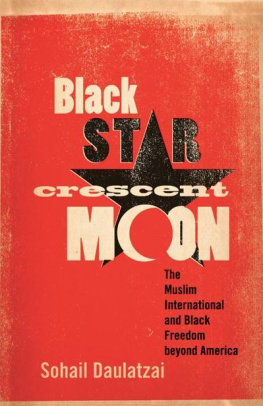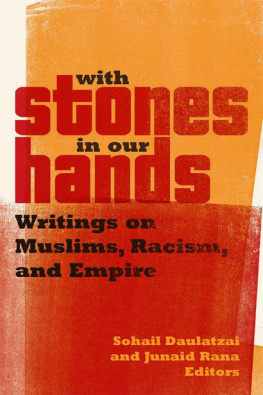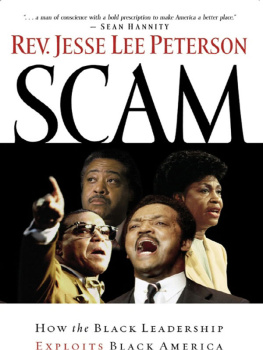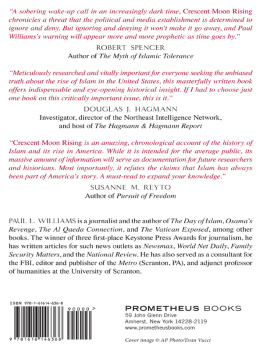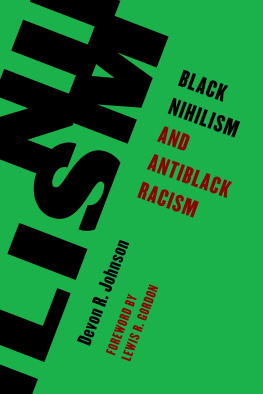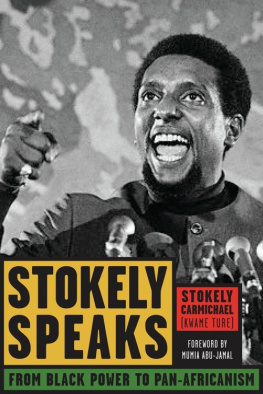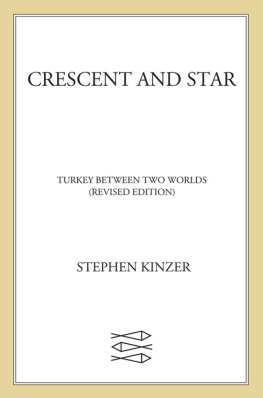Sohail Daulatzai - Black Star, Crescent Moon: The Muslim International and Black Freedom beyond America
Here you can read online Sohail Daulatzai - Black Star, Crescent Moon: The Muslim International and Black Freedom beyond America full text of the book (entire story) in english for free. Download pdf and epub, get meaning, cover and reviews about this ebook. year: 2012, publisher: University of Minnesota Press, genre: Politics. Description of the work, (preface) as well as reviews are available. Best literature library LitArk.com created for fans of good reading and offers a wide selection of genres:
Romance novel
Science fiction
Adventure
Detective
Science
History
Home and family
Prose
Art
Politics
Computer
Non-fiction
Religion
Business
Children
Humor
Choose a favorite category and find really read worthwhile books. Enjoy immersion in the world of imagination, feel the emotions of the characters or learn something new for yourself, make an fascinating discovery.
- Book:Black Star, Crescent Moon: The Muslim International and Black Freedom beyond America
- Author:
- Publisher:University of Minnesota Press
- Genre:
- Year:2012
- Rating:5 / 5
- Favourites:Add to favourites
- Your mark:
- 100
- 1
- 2
- 3
- 4
- 5
Black Star, Crescent Moon: The Muslim International and Black Freedom beyond America: summary, description and annotation
We offer to read an annotation, description, summary or preface (depends on what the author of the book "Black Star, Crescent Moon: The Muslim International and Black Freedom beyond America" wrote himself). If you haven't found the necessary information about the book — write in the comments, we will try to find it.
Black Star, Crescent Moon: The Muslim International and Black Freedom beyond America — read online for free the complete book (whole text) full work
Below is the text of the book, divided by pages. System saving the place of the last page read, allows you to conveniently read the book "Black Star, Crescent Moon: The Muslim International and Black Freedom beyond America" online for free, without having to search again every time where you left off. Put a bookmark, and you can go to the page where you finished reading at any time.
Font size:
Interval:
Bookmark:
CRESCENT MOON

UNIVERSITY OF MINNESOTA PRESS
MINNEAPOLIS | LONDON
The University of Minnesota Press gratefully acknowledges financial assistance provided for the publication of this book from the University of California, Irvine.
Every effort was made to obtain permission to reproduce material used in this book. If any proper acknowledgment has not been made, we encourage copyright holders to notify us.
Copyright 2012 by the Regents of the University of Minnesota
All rights reserved. No part of this publication may be reproduced, stored in a retrieval system, or transmitted, in any form or by any means, electronic, mechanical, photocopying, recording, or otherwise, without the prior written permission of the publisher.
Published by the University of Minnesota Press
111 Third Avenue South, Suite 290
Minneapolis, MN 55401-2520
http://www.upress.umn.edu
ISBN 978-1-4529-3358-0
The University of Minnesota is an equal-opportunity educator and employer.
This thought keeps consoling me:
though tyrants may command that lamps
be smashed
in rooms where lovers are destined to meet,
they cannot snuff out the moon, so today,
nor tomorrow, no tyranny will succeed,
no poison of torture make me bitter,
if just one evening in prison
can be so strangely sweet,
if just one moment anywhere on this earth.
FAIZ AHMED FAIZ, A PRISON EVENING
O N J ANUARY 20, 2009, Barack Hussein Obama was inaugurated as the forty-fourth president of the United States. On that day, perfectly planned to coincide with the national celebration of the Martin Luther King Jr. holiday, more people gathered in Washington, D.C., than for any other event or protest in the nations history, eclipsing even the original March on Washington, which Dr. King made as the highpoint of American political theater. As hundreds of thousands of people gathered, tens of millions more watched on television to witness the inauguration of the first admittedly Black president in the nations history.
Also present that day were other forces that were visible but unseen, felt but not heard. For the ghosts of Americas past and present hovered all over the nation. The ghosts of Frederick Douglass and Ida B. Wells, of lynching and of slavery. There were also the ghosts of the silent wars of mass incarceration and the living dead in poverty, the ghosts of the nameless war dead in Iraq, AfPak, and other unnamed places, as well as the looming specter and the phantom figure of the Muslim. For many, Obamas election was a national exorcism, a purging of the past and a reckoning with the present, as the empire was reeling from massive dis-content, economic anxieties, and the perpetual wars fought in its name.
While the spirit of Dr. King was already present, the figure of Malcolm X was also conjured, if only to try to exorcize him from the national past and the nations future. A key and telling moment occurred when Senator Dianne Feinstein, of California, gave the introductory remarks at the inauguration, saying, Those who doubt the supremacy of the ballot over the bullet can never diminish the power engendered by nonviolent struggles for justice and equalitylike the one that made this day possible. Feinstein continued, saying that future generations an empire state of mind would look back and remember that this was the moment that the dream that once echoed across history from the steps of the Lincoln Memorial finally reached the walls of the White House.
Not surprisingly, on the inauguration day of a Black president, both King and Malcolm Xthe twin poles of Black redemptive possibility were conjured and invoked. And the stark choices they purported to represent no longer seemed relevant with the election of Obama. For the choices between integration and separation, dream and nightmare, Civil Rights and Black Power, patriot and internationalist were now seemingly irrelevant, for as Feinstein suggested, Kings and Civil Rights emphasis on the ballot and nonviolence in contrast with what was assumed about Malcolm and the bullet was vindicated by history through the election of Obama to the White House.
But in celebrating King and Civil Rights that day, Feinstein not surprisingly viewed King through a narrow interpretive lens, invoking a frozen and ossified memory of himone in which he is remembered as While Kings internationalism and criticism of U.S. society were ignored in favor of a more accommodating image of him, Feinstein invoked Malcolm in order to dismiss him not only because of his call for a Black internationalism that tied the fates of Black peoples with decolonization in the Third World but also because of his penetrating critiques of U.S. foreign policy. In celebrating that pacifist memory of King and ignoring and dismissing the penetrating depth of his and Malcolms thought, not only did Feinstein and the political establishment frame Obamas victory with the triumphalist narrative of Civil Rights, but more important, Obamas victory also served as a vehicle to co-opt, contain, and strip away any of the remaining vestiges of internationalist impulses emanating from Black political culture.
But in the logic of Civil Rights, Feinstein was suggesting and reaffirming that, yes, Black peoples do have a stake in this country and that the feeling is mutualthat not only does their vote count, but it also matters. The narrative of Civil Rights has tremendous purchase and traction in the United States, because it has been used to rewrite the 1960s, underwrite the white backlash and the culture wars of the 1980s and 90s, and cement the politics of the New Right, which assumes that race has been transcended and that the United States has fulfilled its national destiny. Most important, the Civil Rights narrative has assumed that Black freedom could be achieved within the legal frameworks and political institutions of the United States.
As scholars and historians have shown, Civil Rights has also had a flip side to it that has had to do with its assumptions about U.S. foreign policy and Black peoples relationship to the rest of the world. When it emerged from the Cold War and the Red Scare of communism in the aftermath of World War II, Civil Rights assumed that the United States moral standing in winning the hearts and minds of the decolonizing nations of Africa and Asia (which includes what is now the Middle East) was linked to its treatment of Black peoples in the United States. In exchange for legislation on education, interstate transportation, voting rights, and other measures, the Civil Rights establishment supported an aggressive U.S. foreign policy in the name of anticommunism, including U.S. covert interventions and wars in Africa and Asia to prevent Soviet influence from spreading there, because communism was viewed by the United States as a bigger threat to the Third World than colonialism.
The election of Obama only served to further intensify the euphoria around the narrative of Civil Rights, as his election suggested to many that white supremacy no longer exists in a postracial America and that Black freedom not only can be realized in the United States but already has been. In affirming the triumphalist narrative of Civil Rights and seeking to create domestic consensus of racial harmony, Obamas election also sought to project the United States as a force for good in the world, making Black internationalism irrelevant or, through the Kenyan-descended Obama, as now being embodied in the larger narrative of American universalism. In contrast to what many perceived to be a reckless and rogue unilateralism of President Bush in the post-9/11 era, the election of Obama was seen as a calming balm, a kind of national healing, as the United States could now be presented as a moral beacon to the world that spreads democracy and freedom while restoring faith to those at home.
Font size:
Interval:
Bookmark:
Similar books «Black Star, Crescent Moon: The Muslim International and Black Freedom beyond America»
Look at similar books to Black Star, Crescent Moon: The Muslim International and Black Freedom beyond America. We have selected literature similar in name and meaning in the hope of providing readers with more options to find new, interesting, not yet read works.
Discussion, reviews of the book Black Star, Crescent Moon: The Muslim International and Black Freedom beyond America and just readers' own opinions. Leave your comments, write what you think about the work, its meaning or the main characters. Specify what exactly you liked and what you didn't like, and why you think so.

